

The fuel tank is responsible for holding the gas or diesel that runs the vehicle. Obviously, this job is very important. On top of being extremely inconvenient, a leaking or faulty fuel tank is downright hazardous. Gas vapor is a big contributor to smog, and will ignite easily in the right concentration. Liquid gas is flammable (and should be cleaned up whenever it’s spilled), but it is still much more stable than vaporized gas. For these reasons, fuel tanks need to be reliable and have to last a significant amount of time. Modern cars have fuel tanks made of lightweight plastic materials. What a tank is made out of is a big factor in the lifespan of the fuel tank.
What are fuel tanks made out of?
Car manufacturers have been using coated steel fuel tanks in vehicles since the early days of automotive production. A tin-lead coating prevents corrosion and ensures the tank will last for years. For applications where weight was a concern, aluminum serves as a good alternative to steel. For the last couple of decades, the use of HDPE (high-density polyethylene) has been gaining in popularity.
HDPE is a type of plastic that is strong, durable, and resistant enough to shock and extreme temperatures to be used for such a crucial part. Because HDPE is so malleable and flexible when it is warm, it can be formed into very complex shapes to perfectly fit wherever there is space under the car. This means manufacturers can place the tank in a spot that is more resistant to puncturing in the event of an accident. Since there are no seams in the tank, there are no weak points that may break if the tank flexes.
How long does each type last?
For metal fuel tanks, the minimum that manufacturers aim for is 10 years of use. Now there will be some variance in how long each material might last individually, either coated steel or aluminum, but unless there is some external damage done to the tank then it will last at least a decade. Some tanks last for decades, so metal tanks only need to be replaced if they are damaged or if they have corroded severely.
HDPE fuel tanks can potentially last a very long time, as the plastic is not prone to corroding and can flex slightly when put under pressure. HDPE itself was developed specifically to contain harsh chemicals and is used to hold chemicals significantly more dangerous than gasoline, so in that respect tanks made of HDPE are over-engineered. Durability wise, they will last at least 10 years with the average being above that. The worst enemy of HDPE is shock and extreme temperature, but the material is durable enough to deal with average wear and tear.



